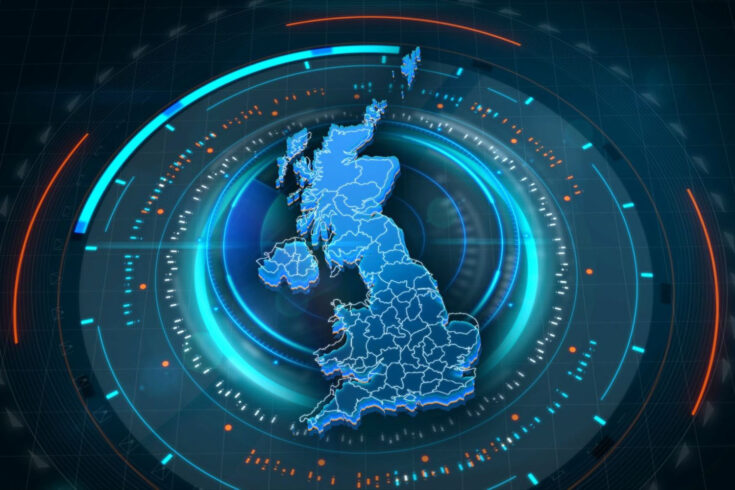The development of the fifth generation (5G) cellular technology infrastructure and digital services provided by connectivity is estimated to deliver a £43 billion boost to the UK economy by 2030.
5G isn’t just going to be the next generation of mobile cellular network technology, it’s going to be a step change in:
- speed
- capacity
- reliability.
Unlike previous generations that are mainly designed to support connectivity for people, 5G is set to support connectivity for both machines and people. It is set to revolutionise the way and the speed at which people will communicate and work.
Faster, stronger, better
5G will ultimately deliver:
- a faster connectivity
- stronger security
- better reliability.
However, these attributes may seem to be describing incremental qualities only. 5G cannot be incremental only, to provide the improved benefits of the advanced communications technology.
It needs to be far more transformative and disruptive than the past generational shifts to achieve the real tangible benefits of this next generation technology.
The key is understanding and utilising significant capabilities of 5G and variety of scalable business models whilst evolving the infrastructure and architecture to lead to substantial economic growth.
It is also essential that businesses develop new products and services, and everyone is inspired to solve challenging complex problems. This will require a significantly larger investment than in prior generations.
5G will be a major technology for growing business innovation and industry digitisation. A more reliable and higher capacity wireless communication infrastructure that 5G will deliver is going to enable:
- greater assurance in the development
- delivery of online services for the public and business.
From the deployment of drone deliveries to hospitals for samples and medical supplies to enhancing the shopping experience. 5G is going to be essential for the daily functioning of not only our economy but:
- society
- government
- military.
The evolution of satellite systems and satellite communications is also complementary to 5G and presents additional revolutionary steps in digital communications. An evolution which will fundamentally change our ability to share information and touch every sector in every industry.
New opportunities using 5G
New applications and service offerings will take advantage of this integrated network of systems with both terrestrial and space-based components working together.
As the networks are brought to fruition across the country and globally new opportunities and the development of new applications and services of 5G will open up for:
- chip makers
- semi-conductors
- smart grids
- telecoms
- cell towers
- mobile companies
- real estate.
The pandemic has been a huge factor in the advancement of 5G, while 5G is going to be an essential part for rebuilding a better-connected UK and economy in the post pandemic world.
A 5G rollout at pace will help to drive a stronger economic recovery, providing an essential tool to build local strengths and ‘level up’ in the regions.
Through high-quality and advanced capacity 5G wireless connectivity, existing digital services will be boosted across the country and new services will be made possible.
Such services will contribute to our recovery from the pandemic and make the UK a leading nation in the use of 5G by shaping the future digital economy.
Innovation across industries and sectors
Recognising the importance of strong digital foundations, the UK government committed the UK to becoming a global leader in 5G technology.
The Department for Digital, Culture, Media and Sport (DCMS) diversification strategy clearly outlines our ambitious plan to grow our telecommunications supply chain. Plus changing the UK supplier landscape to ensure that they are resilient to future trends and threats.
We support the DCMS diversification strategy which has three core strands:
- supporting incumbent suppliers
- attracting new suppliers into the UK market
- accelerating the development and deployment of open-interface solutions.
Diversification of the UK’s 5G ecosystem is going to be a big opportunity to develop the role of UK small and medium-sized enterprises (SMEs) in the telecommunications industry.
The open innovation and collaboration model is a unique way to approach the challenge of how the UK creates a diverse telecommunications market. Diversification will enable greater support to the creation of homegrown and sovereign products and services underpinned by digital technologies.
5G not only presents opportunities for innovation based on wireless connectivity, it also embraces innovation from other domains. These include the use of artificial intelligence (AI) and moving from physical to virtual cloud-based functions, including computing and security.
This radical shift is an opportunity to leverage the UK’s innovative SME base in cloud and AI to develop innovative scaling and provisioning of solutions for a global marketplace.
The shift to service and cloud-based operation at the core network presents a unique opportunity for innovators from other domains. Here experts can cross over from other areas of software development to address challenges such as service optimisation to drive innovation in the telecommunication sector.
5G is already leading the convergence of technologies. Innovations in AI and virtual computing driven by the utilisation of 5G offers an opportunity to create symbiosis in societal and business applications via data and digital twinning (simulation). Supporting the development of the circular economy and the push to net zero.
Thus, the enabling capability of 5G to drive forward converging technologies presents a great opportunity for innovators. Unlike previous generations of mobile technology, the business potential of 5G will not be demonstrated by a series of killer apps.
The value of 5G will be demonstrated by the pace of applications moving from the physical to virtual world and realised by the transformation of industries.
Expanding network functionality
5G is a huge opportunity for digital services and offerings. At the same time, it presents additional functionality to the network enabling direct integration with internet of things (IoT) edge devices.
Mass adoption of protocols like narrowband and medium band IoT have the potential to enable low power wireless connectivity boosting innovation in industrial IoT.
Enabled via ubiquitous cellular or private infrastructure, enhanced connectivity will be possible in agriculture or complex and mission critical applications. Applications such as health and manufacturing.
As 5G develops, it will unlock a wider range of applications and technologies to cellular networks. Further driving the digitisation of industry, supporting greater automation, and improving productivity regardless of industry. Terms such as agriculture 4.0 is going to become a reality.
Integrating low power edge sensors with high bandwidth applications of interactive experience such as virtual reality, augmented reality and their mix will also enhance the development and design the future environments.
AI systems utilising 5G networks will cite the network provider as both a potential root of trust for authentication and security along with a point of audit for data transmission and sharing.
Assurance and security on the networks will help increase trust and confidence in emerging uses of AI and autonomous services for both the individual and business.
5G networks inevitably re-incubated and matured to go into satellite and unmanned aerial vehicles as well as sixth generation. 5G will continue to support smart cities, intelligent towns and digital offices with super-fast connectivity at extremely high capacity.
Data handling via network providers is also going to have the ability to provide assurance as a service as part of the 5G network.
Complex supply chains utilising the 5G networks will benefit from increased availability of data and enhanced ability to route and respond to change. This improved efficiency of the movement of goods and people will be helpful in pushing the UK’s leap forward toward its net zero goal of 2050.
Opportunities, investments, and maturing ecosystem of players

Credit: Andy, iStock via Getty Images
The UK government has been investing in numerous initiatives to support technical development and adoption of 5G networks to achieve the future vision and potential for 5G.
One of these significant investments is the DCMS 5G Testbeds and Trials Programme, a nationally coordinated programme across a range of geographic and industry use cases.
The investment in 5G has gone into projects, test beds and trials across all four nations of the UK. The programme is looking to harness areas where the UK has expertise and a competitive advantage. Areas such as scientific research, engineering talent and rich variety of technology businesses.
From Sherwood Forest to Shropshire NHS, the UK has been exploring the future of connectivity to uncover the potential applications of 5G technology. These trials have helped inform how 5G can greatly influence:
- productivity and business growth
- lives of people in rural areas
- support for regional growth
- responses to health crisis and other fundamental environmental and societal challenges.
Innovate UK has been supporting the UK5G Innovation Network delivery through Knowledge Transfer Network and funding Digital Catapult in its engagement with industry to help accelerate making 5G a reality.
StudioUK Programme funded by Innovate UK for example aims to provide a 5G-enabled virtual production facility for independent production companies. Companies that cannot access larger commercial facilities, and for early-stage innovative companies to develop new tools and applications.
The facility is equipped to provide access to a variety of technologies including:
- artificial intelligence
- cloud rendering, and edge computing
- real time game engines, and immersive technologies.
Complementing the nationwide network of existing production facilities that are our greatest homegrown treasures. Capitalising on the combination of technology and creativity that we do so well in the UK.
Innovate UK has also been supporting the development of a national testbed infrastructure and wider innovation network to present both opportunities to:
- test innovations that utilise 5G networks
- test innovations that enhance the 5G core network technology.
The testbed called SmartRAN Open Network Interoperability Centre is a DMCS joint programme between Digital Catapult and Ofcom.
The programme focuses on for testing interoperability and integration of open networking solutions, starting with Open Radio Access Network (RAN) and help with vendor diversification.
Driving the future economy
As the UK’s innovation agency, we are strongly committed to innovative UK businesses. The Innovate UK plan for action focuses on:
- UK business innovation (three)
- the growth of innovative companies
- building the future economy.
Our focus is the same when we are engaging with businesses within the 5G industry. With specific interventions and via grant schemes such as Smart, innovations in 5G have been funded. Funded to boost the value and increased growth of innovative UK companies at home, and in international markets.
At Innovate UK, we work to involve talented organisations and people to create a vibrant and successful innovation ecosystem inside and outside of the telecommunications domain.
We continue to use our knowledge to support business innovation, boost our global technology presence and create innovative partnerships in the 5G industry.
This includes mission based programmes and schemes such as the Global Business Innovation Programme enabling UK innovators to take part in co-ordinated missions to targeted markets and collaborate with international innovation communities across the world.
One of those global business innovation programmes is currently open to all UK 5G innovators, to explore the 5G and cellular technology opportunities in Japan. Please get in touch to find out how we can support your business to make the most of this opportunity.
Further information
You can connect with Esra on LinkedIn
Follow Innovate UK on Twitter
Connect with Innovate UK on LinkedIn
Follow Innovate UK on Facebook
You can go to the new Innovate UK website
You can go to the Innovate UK EDGE website
Subscribe to our YouTube channel
Sign up for our email newsletter
Top image: Credit: Muhammet Camdereli, iStock via Getty Images






